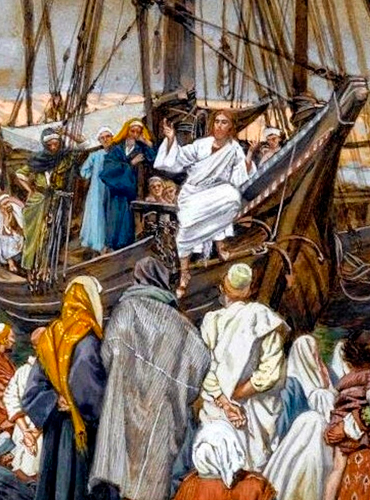Monday of the Third Week of Easter – Jn 6:22-29
Today’s Gospel begins a week-long read through of the Bread of Life discourse, from the sixth chapter of John’s Gospel. Each day we will hear a selection from that Eucharistic discourse, all of which finds its definitive fulfillment in the Paschal mystery, but today we set the stage for what follows. After having fed the 5,000, Christ walks across the sea, comforts His disciples, and heads to Capernaum. The next day, the crowds are surprised when they find Him there, since there was only one boat, and Christ hadn’t gone in it. Hence, they ask Jesus, “Rabbi, when did you get here?,” and thus begins Christ’s discourse.
There is a lot that can be said about this passage, but two things stand out: first, the question that the crowds ask, “Rabbi, when did you get here?,” and, second, the particular phrase Christ uses in His reply: “On [the Son of Man], the Father, God, has set his seal.”
Regarding the first, Saint John Chrysostom comments that the crowds should have been astounded to see Christ there. He notes that Christ has just shown Himself to be greater than Moses, anticipating what the crowds will tell Jesus, namely, that Moses gave their ancestors manna in the desert. The crowds should see that Jesus is greater than Moses because, while both crossed large bodies of water, Moses did so only through prayer and divine intervention, while Christ made the sea hold Him up, walking upon it as if it were pavement.[1] However, they fail to see this. Indeed, even their former enthusiasm to make Christ a king has died away; when they were filled with sensible goods, they wanted Him to rule over them. Now He is simply “Rabbi,” and not kingly material. By this, says Chrysostom, we see that sensible goods are fleeting, and that we cannot seek our definitive rest or repose in them. God uses sensible goods to guide us to Himself, but we are to be rebuked and upbraided if we stay in them.
To the crowd’s question, Jesus gives a non-answer that cuts to the heart of the matter; the people wanted to be fed physically, but really they should be concerned about doing God’s work, seeking “the food that endures for eternal life, which the Son of Man will give you. For on him the Father, God, has set his seal.” In ancient times, seals were pieces of metal or stone with designs that would be pressed into hot wax. They were more valuable than signatures, since seals were hard to copy, and would serve to certify documents or shipments. In his commentary on this passage, Aquinas says this “seal” can be understood in many ways, but we can consider how Saint Hilary explains it: God the Father “impressed Christ with his seal. For when a seal is impressed on wax, the wax retains the entire figure of the seal, just as the Son has received the entire figure of the Father. . . . These words should be understood as referring to the mystery of the incarnation, because God the Father has impressed his Word on human nature; this Word who is ‘the brightness of his glory, and the figure of his substance’” (Heb 1:3). Since eternal life is to know God, as Jesus says in the Last Supper (Jn 17:3), Christ brings us eternal life by revealing the Father to us.
Today, we can ask ourselves if we are still clinging to any sensible things, if we are attached to them, since this makes it difficult to follow Christ. Likewise, in the Song of Songs, we are told to “set God as a seal upon our hearts.” How well do we reflect God in our daily lives? Do we live as though we were “sealed” by Him? Today, through the intercession of Mary, Mother of the Eucharist, let us ask for the grace to embrace God’s love for us as revealed in the sacrament of the Eucharist.
[1] Cf. Homily 34 on John.






